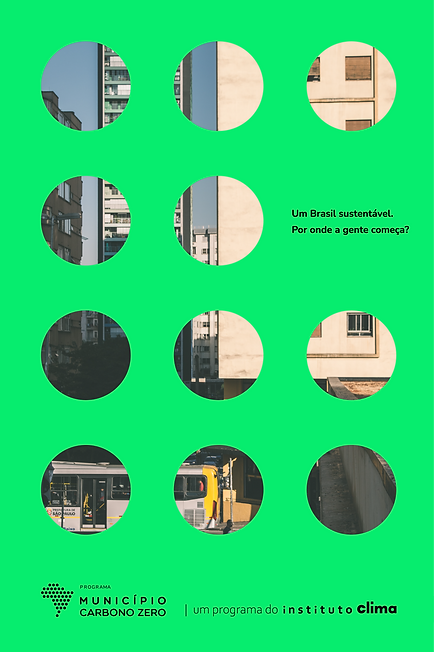


The protection and restoration of forests can reduce carbon emissions by 25%.
This reduction is
necessary to limit global warming to 1.5 Celsius degrees by 2030.
And that is the purpose of the Zero Carbon Municipality Program.
The objective of the Program is to maximize local initiatives by designing and supporting the implementation of municipal policies and projects that aim to balance the climate system and that are aligned with the 2030 Agenda and the Brazilian NDCs.


the achievement of international climate goals.
Support
O Programa inicia sua implementação na área de florestas, mas atuará nos 5 segmentos abrangidos pelo IPCC:
LULUCF
Indústrias
Energia
Agropecuária
Serviços

Brazil has 5,570
opportunities,
to make a difference in the country's climate change.
Brazil has 5,570 municipalities and together they can make a difference in the country's climate balance.

Include and Strengthen
The municipality as a relevant actor in climate policy.

Give scale

Approach
The policies climate publics.
Public policy with actions at the cutting edge.

Support
Achieving international climate goals.

From Peabiru to Brazil.
The initiative took its first steps in Paraná, at the municipality of Peabiru, with the protagonism of Maria Tereza Uille's actions, and became a national approach program,
through the partnership with CNR and CNM. The project, from the start, was thought of in a systemic way to be scalable to other Brazilian municipalities.
Systemic and Scalable.
The Zero Carbon Municipality Program measured, at Peabiru, the municipality's carbon stock. The data were analyzed and indicators were generated to evaluate the municipality's permanent conservation areas. The methodology is fully replicable, and is already being applied in other Brazilian municipalities.

TOTAL EMISSIONS ALLOCATED AT PEABIRU 2000-2019 (mil tCO2e)

Data Collection
The program supports data collection, diagnoses,
analysis of economic, socio-environmental and climate profile of municipalities, climate risk analysis, among several others that assist in the development of municipal climate policies.

Qualify, Train and Implement
Train municipal executive and legislative officials to implement climate policies in alignment with international goals and standards. Exchanges between municipalities will also be encouraged.

Municipal Projects and Goals
The program funds training in climate policy, program and project design, and supports the municipality in developing its municipal climate policy.

Fundraising and Financing
The program funds qualification in climate policies, development of programs and projects, and supports the municipality in drafting its municipal climate policy.

Data Collection


Municipal
Projects and Goals
Qualify, Train
and Implement

Fundraising and Financing

Implementation Framework

1. Strategy
The Program has a Deliberative Council in which CNM, CNR and Instituto Clima participate. This Council is where the Program is coordinated and managed at a strategic level, where the Program's Investment Plan and new partnerships are approved, and where the impact and contributions of the program to the international climate agenda and the Brazilian NDCs are monitored.
2. Implementation
The general coordination of the Program is done by the Instituto Clima, where the executive secretariat is located. It is here that the Program's actions are planned and implemented. The Deliberative Council may approve the establishment of regional committees to support the implementation of the Program, and these committees will report to the general coordination.
3. Financial Management
The financial management is structured according to the source of the funds and its own guidelines and rules. The resources can be destined directly to the Instituto Clima, to a financial manager that will be
under the general coordination of the Program or there can even be a technical cooperation where actions are carried out also under the general coordination of the Program and without financial transactions.
CNM,CNR and Instituto Clima
United for Agenda 2030.
The equilibrium of the climate system is the challenge to be met by People and Nations in order to limit the increase of the Planet's global temperature. It is one of the greatest humanitarian challenges of the present generation and of generations to come.
At the COP in Glasgow, in addition to the new goal, the Brazilian Ministry of the Environment presented guidelines for the strategic agenda directed at climate neutrality. Today our challenges are:
Eliminate illegal deforestation by 2,028.
Restore and reforest 18 million
hectares of forests by 2030.
To reach, by 2030, a 45-50% contribution from renewable energies in the composition of
the energy matrix.
Restore 30 million hectares of degraded
pasture of degraded pastureland.
Encourage the expansion of the railroad network.

A partnership:



How to participate
There are two options for participating in the Zero Carbon
Municipality Program. Through calls and partnerships made by the National Confederation of Municipalities - CNM, and by expressing interest through the form:
